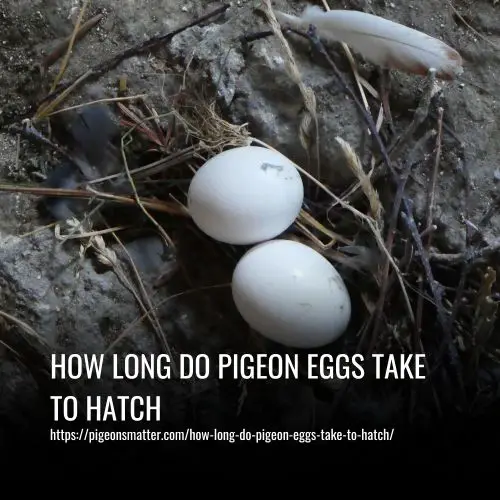The incubating period for pigeon eggs is approximately 18 days until they hatch. Both male and female pigeons take turns incubating the eggs to maintain optimal temperature and promote healthy growth.
Pigeon chicks require parental care and protection until they are self-sufficient, with hatching time being influenced by environmental factors such as temperature and humidity. The incubation period for a pigeon egg is influenced by environmental factors such as temperature and humidity.
Pigeons typically lay a clutch of two eggs, and both parents take turns incubating them. Maintaining ideal conditions is crucial for healthy development and successful hatching.

What Month Do Pigeons Lay Eggs?
May is an important month for pigeons as it’s the time when they lay their eggs.
The typical number of eggs laid by pigeons is two, which are then incubated for approximately 18 days.
After hatching, the newborns, referred to as squabs, are born blind and incapable of flight.
The young birds stay in the nest for about six weeks until they are capable of taking care of themselves and leaving.
It’s important to give these young pigeons space and time to develop before they are ready to leave the nest.
When Do Pigeons Start Laying Eggs?
Pigeons typically lay their first egg at around 5 to 6 months of age. This is because it takes that long for female pigeons to mature and become ready to breed. It’s important to ensure that they have access to nutritious food and clean water to aid in their development. Without these resources, pigeons may take longer to mature.
It’s also normal for pigeons to mate at around 3 to 4 months of age, but this doesn’t mean they will immediately lay eggs. They need to reach maturity first, which typically takes around 5 to 6 months. So, if you see your pigeons mating at a young age, don’t worry, it’s a natural behavior. Just make sure they have the necessary resources to develop properly.
How Often Do Pigeons Lay Eggs?
Pigeons have a reproductive cycle that allows them to lay up to 12 eggs per year, resulting in an average of 24 eggs annually.
However, it’s important to note that not all eggs may hatch, and you may end up with fewer eggs than expected. While it’s possible to get two eggs every month, it’s not guaranteed that all eggs will be viable.
In general, pigeons will lay eggs constantly with a break of about one month in between. Pigeons kept in cages may be more focused on laying eggs than those kept in open spaces. After the egg-hatching process is complete, the mother pigeon will prepare for lie eggs again within two weeks.
It’s important to give pigeons a rest between laying eggs to prevent the rate of infertile eggs from increasing and to avoid negatively impacting the pigeon’s health. Separating male and female pigeons for a while can help achieve this. By giving your pigeons a break, you can increase the chances of getting healthy and fertile eggs for breeding.
How Many Eggs Do Pigeons Lay?
Understanding pigeon egg-laying patterns can help you identify potential issues with your pigeon population.
A typical pigeon will lay two eggs within a 24 to 48-hour period. If you notice three eggs, it could be a sign of an infertile egg, as it is uncommon for pigeons to lay three eggs. If you find four eggs in a nest, it is likely that both pigeons are female, and it may be necessary to bring in male pigeons to balance the population.
If you find pigeon eggs on your balcony, it’s important to handle the situation carefully. It is illegal to disturb or harm pigeon nests in many areas, so it’s best to contact a professional to safely remove the eggs and relocate the pigeons if necessary.
What Do I Do With Pigeon Eggs on My Balcony?
Discovering pigeon eggs on your balcony can be a unique experience, but it’s important to handle the situation with care to ensure the safety of the eggs and the birds.
1. Do Not Touch the Eggs:
Touching the eggs can damage them and make it difficult for the parents to care for them. It’s best to leave them alone and let the parents handle their care.
2. Move the Eggs to a Safer Location:
To ensure the safety of the eggs, it may be advisable to relocate them from a hazardous location where they could be stepped on or damaged to a more secure spot.
However, be careful not to disrupt the eggs or damage them in the process.
3. Attract the Parents Back to the Nest:
To lure the parents back to the nest, one can place food nearby. This can encourage them to return and continue caring for their eggs.
4. Consider Incubating the Eggs Yourself:
Individuals with bird care experience and confidence in their ability to care for eggs may choose to incubate them independently.
However, this should only be done if you have the necessary knowledge and resources to care for the eggs properly.
Pigeon Egg Size
Pigeon eggs come in varying sizes depending on the species. The common pigeon egg typically measures between 3 cm to 4 cm, while the King Pigeon lays bigger eggs due to their larger size. The eggs of bigger pigeons are also relatively bigger than those of other common pigeons.
When compared to a chicken egg, a pigeon egg is visibly smaller, measuring at slightly less than half its size. The shell of a pigeon egg is not very strong and can be easily broken with a small hit. Therefore, it’s important to handle the eggs with care and avoid applying too much pressure when holding them.
Do Pigeons Leave Their Eggs Unattended?
Birds, including pigeons, are protective of their eggs and will not leave them unattended for extended periods. Leaving eggs vulnerable to predators and the elements can be detrimental to their survival.
When pigeons need to find food or water, they will often leave their eggs for a short time. However, if they need to leave them for a longer period, they will construct a nest made of twigs and leaves to keep them safe.
This is a natural behavior that ensures the survival of their offspring.
Mating Behaviors
Knowing the mating behaviors of pigeons can help you anticipate when they may lay eggs. Pigeons exhibit monogamous behavior and tend to mate with the same partner in each breeding season. They can raise multiple broods in a season as long as the climate is suitable.
Male pigeons choose their mate and will show off to her with cooing sounds and strutting. If the female reciprocate, they will find a place to build a nest together where they will mate and the female will lay up to 3 eggs.
It’s important to understand these behaviors to provide the best care for your pigeons. This article was written by a qualified veterinarian to ensure the most reliable advice for your pigeon’s health and well-being.
Nesting Habits
Male and female pigeons work together to build their nests. The male selects a location and brings back a stick to signal to the female where he’s chosen to build the nest. They then complete the nest together.
Pigeons typically build their nests in out-of-the-way places like ledges under a bridge or a flat rooftop, rather than in trees. Nest shapes resemble saucers, are 11-12 inches in diameter, and are usually constructed of leaves and stems.
Pigeon pairs have the ability to have two nests during mating season, typically laying a couple of eggs. The female incubates the eggs after a few days of sitting in the nest. Pigeon pairs may choose to reuse the same nest or construct a new one in the same location for future broods.
It’s important to keep these natural instincts in mind when breeding pigeons to ensure they have the space and resources they need to care for their eggs and babies.
A Pigeon’s First Egg
Female pigeons begin their journey to motherhood at around four to five months after hatching when they start searching for a mate. The maturity of a pigeon depends on the nutrition it receives throughout the start of its life, and this process may take longer for those living in the wild.
Female pigeons may not begin laying eggs until their development is complete, regardless of their ability to mate at four to five months old.
An adult pigeon usually lays its first egg at five or six months of age and usually lays no more than two eggs at a time, with a gap of twenty-four to forty-eight hours between egg-laying. In very rare cases, they may lay three eggs.
Incubation and Hatching
Pigeon eggs are usually incubated for around 18 days before hatching. Both the male and female pigeons take turns incubating the eggs during this time. It is rare to use an incubator to hatch pigeon squabs, but it can be done if you find an abandoned egg.
Baby pigeons remain in their nests for an extended period of up to 29 days, sometimes more, which is longer than other bird species. Due to their resemblance to adult pigeons, they may go unnoticed.
During their time in the nest, baby pigeons grow quickly, and the parents must provide constant nourishment. Young pigeons, also known as squabs, are nourished with a substance called crop milk, which is created by adult birds through regurgitation and is composed of liquid food.
After about 10 days, they start to eat more traditional pigeon food brought back to the nest by the parents.
Pigeon Eggs Not Hatching After 21 Days?
It’s not uncommon for pigeon eggs to fail to hatch, with 10-15% of nests containing eggs that will never hatch. Pigeons will typically incubate their eggs for up to 18-20 days but may abandon them after this time. However, this does not necessarily mean that the chick is dead, as pigeon chicks can still hatch after 21 days.
If you find an unhatched pigeon egg, it’s important to keep it warm and monitor it closely. Under temperate conditions, an egg can remain viable for up to 7 days without incubating. If the egg has not hatched by the 26th day, the probability of it hatching becomes low.
To determine if a chick is still alive inside the egg, you can try listening for sounds or using the “candle test” by shining a light into the egg. If you suspect that the egg is not viable, it’s best to dispose of it properly.
When Pigeons Don’t Reproduce
Breeding pigeons can be a challenging task, especially when faced with infertility or barrenness in your mating pair.
If you notice that your pair is not producing any eggs or that the eggs are not hatching, it could be a sign of infertility. Separating the pair and introducing them to other pigeons may increase their chances of successful breeding.
Infertility can be caused by various factors, including age, stress, poor nutrition, or genetics. It’s important to provide your pigeons with a healthy and stress-free environment to increase their chances of successful breeding.
If you continue to experience infertility issues, it may be helpful to seek advice from a veterinarian or experienced pigeon breeder. With patience and persistence, you can increase your chances of successful pigeon breeding.
Breeding More Than One Pair
Breeding pigeons can be a rewarding experience, and understanding their natural behavior is essential for successful breeding. Pigeons are known to be social creatures and exhibit enjoyment in interacting with others of their species.
In the wild, they often roost and nest near one another. Allowing this natural process to occur in captivity can result in healthier mating habits and stronger offspring.
Pigeon eggs typically take around 18 days to hatch, but this can vary slightly. It is important to not interfere with the natural process to encourage parental care and ensure the health of the babies.
By understanding and respecting the natural behavior of your pigeons, you can create a happy and healthy breeding environment.
The Difference Between Pigeon and Dove Egg Hatching Time
Doves and pigeons are similar in many ways, but there are some differences between them, one of which is the time it takes for their eggs to hatch.
The incubation period for pigeon eggs is approximately 18 days, while dove eggs take around 14 days to hatch. Although this is not a significant difference, it is interesting to note how even small variations can occur within the same family of birds.
Nesting Habits How Many Eggs Incubation What Pigeon Nest Look Like
Pigeons have a unique nesting habit where the male selects a nest site in the female’s view and brings sticks for her to build a saucer-like nest of stems and leaves. These nests can be found on ledges, rafters, beams, under bridges, or inside barns.
Female pigeons can lay eggs at 6 months and usually lay 2 white eggs in each clutch. Both the male and female will incubate the eggs, but the female spends the most time on the eggs.
After 18 days of incubation, the eggs will hatch, and the young pigeons, called “squabs,” will be covered in yellow down. It’s important to respect the nesting habits of pigeons and not disturb their nests, as they are an essential part of their reproductive cycle.
| Pigeon Nesting Stats | |
|---|---|
| Eggs | 2 |
| Incubation | 18 days |
| Nestling Phase | 28 days avg. |
| Broods | Can Breed All Year |
Pigeon squabs go through a rapid growth process that is unique among vertebrates.
Initially, they are fed crop milk, a thick liquid regurgitated by the parent birds. By 10 days, they begin to eat adult food and are no longer dependent on crop milk. In just a day and a half, they can double in size, making them one of the fastest-growing vertebrates in the world.
Within 3 weeks, they are fully covered in feathers, including flight feathers. By day 28, they have completed their tail and full feathering, and their weight is that of an adult pigeon. At this point, they leave the nest and the male teaches them survival skills.
This growth process takes 10-15 days longer than most backyard birds, making pigeon squabs a unique and fascinating species to observe.
FAQs
Pigeon eggs typically take around 17 to 19 days to hatch once the parent pigeons start consistently incubating them.
Yes, both male and female pigeons share the responsibility of incubating the eggs. They usually take turns, allowing each other breaks for feeding and other activities.
The optimal temperature for pigeon eggs during incubation is around 99.3 to 99.5 degrees Fahrenheit (37.4 to 37.5 degrees Celsius).
If pigeon eggs are left unattended for extended periods, especially during crucial stages of incubation, the embryos inside may not develop properly, leading to unsuccessful hatching or even death of the embryos.
Yes, similar to other bird eggs, you can candle pigeon eggs to check for fertility and development. Candling involves shining a bright light through the egg in a dark room to observe the interior. Fertile eggs will show signs of development, such as veins or movement, while infertile ones will appear clear.
As the hatching time approaches, you might notice the parent pigeons spending more time on the nest, increased vocalizations, and sometimes, small cracks or pips appearing on the eggshells. These are indicators that hatching is imminent.
Conclusion:
If you’ve ever wondered how long pigeon eggs take to hatch, the answer is typically around 17 to 19 days. It may seem like a long wait, but the anticipation is well worth it when those adorable little chicks finally emerge from their shells.
So, if you’re lucky enough to have pigeon eggs in your midst, sit back, relax, and get ready for the miracle of life to unfold before your eyes. Happy hatching!


